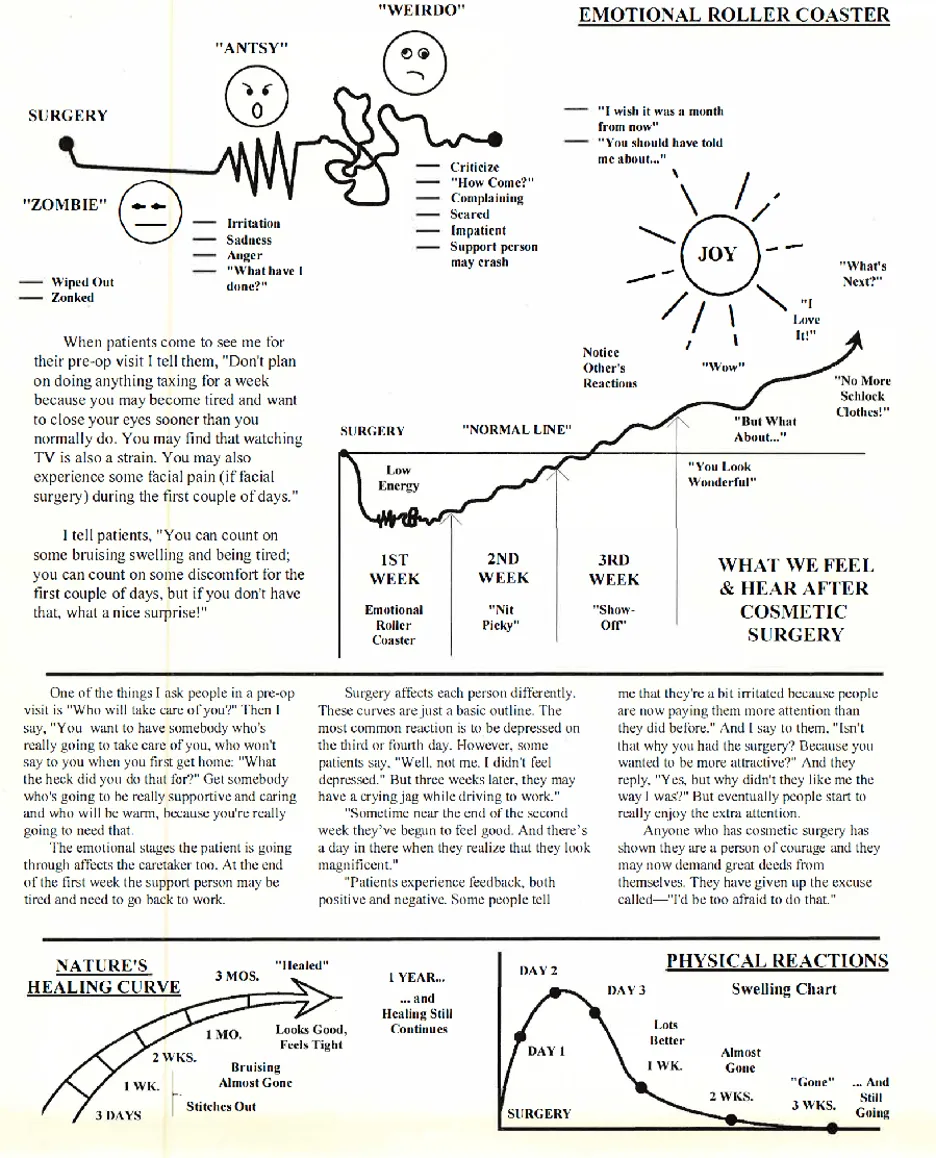



The preparatory phase for surgery really starts about 2 weeks prior to surgery. Most of the information contained in this section really refers to good overall health practices, but some of these directions are specific for surgery.
Please be honest with us about your smoking habits so that we can take good care of you and help prevent problems. We recommend avoiding smoking and second hand smoke for four (4) weeks before surgery and until healing is complete. There is a much greater risk for scarring, poor healing, hair loss, & skin loss in smokers. We further encourage you to give up smoking forever.
If you cannot give up smoking before and after the operation, you may want to rethink your decision to have plastic surgery. People choose to have plastic surgery to improve their looks and sense of well-being, so it makes little sense to jeopardize the results by failing to forego smoking for several weeks. These are totally elective procedure so there is no reason to take any unnecessary risks.
Also, all of the above refers to smoking cannabis as well.
Preparatory Vitamins
The other aspect to minimizing bruising and swelling is taking preoperative vitamins, if you choose to do so. Preoperative vitamins are available through the Vitamin Shoppe or CVS.
Please take vitamins with meals for 5 days prior to and 5 days following surgery. You may take the vitamins on the morning of surgery with a small sip of water. The Arnica Montana may be continued if desired for a total of 10 days following surgery. Please consume these vitamins with meals for five days prior to surgery and five days following surgery.
Hydration and Nutrition
Mom always told you to eat well and drink lots of water. This cannot be more important than during the preparatory phase for surgery. Hydrated patients have less swelling, less pain, and do better after surgery overall. Hydrated patients also have less issues with nausea and vomiting after surgery. Hydration is also important if you take the above vitamins since most vitamins are water-soluble (i.e. they dissolve and are absorbed in water). Proper hydration isn’t only necessary for healing, but may also be necessary to help your body absorb medications following surgery. Be sure to drink at least eight glasses of water every day after surgery to stay hydrated.
A good overall diet is important for your basic health. If you think about athletes, they prepare their body for upcoming races and events. Surgery is no different. Surgery is a stress on the body, and we want your body to react and overcome this stress with the least amount of effort. Therefore, a well-balanced diet is important to maximize healing. Remember the food pyramid with dairy, protein, grains, and fruits and vegetables. Perhaps the most important nutrients in your post-surgery diet are vitamins and minerals. Vitamin A (found in orange and dark green veggies like carrots, sweet potatoes, kale and spinach) and vitamin C (found in citrus fruits, berries, potatoes, tomatoes, melons, and sweet bell peppers) help with wound healing. Vitamin D (found in milk, fish, eggs, and fortified cereals) promotes bone health. Vitamin E (found in vegetable oils, nuts, beef liver, milk and eggs) protects the body from free radicals. Vitamin K (found in green leafy veggies, fish, liver and vegetable oils) is necessary for blood clotting. Zinc (found in meat, seafood, dairy and beans) and iron (found in meat and poultry, beans, apricots, eggs, whole grains, and iron-fortified cereals) are also helpful for wound healing and energy following surgery.
Your body is going to need energy to heal itself after surgery. Fats and carbohydrates are great sources of energy. Fatigue is common following any surgical procedure, but eating the right kinds of carbs can help restore your energy levels. Get carbs from high-fiber foods like whole grains, fruits and veggies, and beans and legumes. These foods will boost energy levels without causing constipation. Healthy fats include olive oil and avocadoes.
The amino acids in protein help with wound healing and tissue regeneration. Protein can also help with strength and energy following surgery. Lean meats such as chicken, turkey, pork and seafood are excellent sources of protein. You can also get protein from eggs, nuts, beans and tofu. Dairy also contains protein, but if you’re struggling with constipation, go for the other sources of protein instead of dairy options. If you have trouble getting enough protein in your diet after surgery, try adding protein powder to drinks or smoothies.
A common complaint after surgery is constipation. To avoid this uncomfortable post-surgery complication, eat plenty of fiber. Some high-fiber foods include fresh fruit and vegetables. Whole grain breads and oatmeal are other great sources of fiber. To prevent constipation, avoid foods like dried or dehydrated foods, processed foods, cheese and dairy products, red meats and sweets.
Alcohol
It is advisable to stop ALL alcoholic drinks for at least 7 days prior to and 7 days following surgery. Remember the studies that said that a glass of red wine is good for overall health? The reason for this is two-fold. Red wine has high levels of anti-oxidants. But, red wine also has an anti-coagulant effect, like aspirin, that prevents blood from clotting. This might be good to prevent heart attacks, but in the immediate post-operative period it can cause increased bleeding, increased swelling, and increased complications. The fact is all alcohol has this anti-coagulation effect. Furthermore, alcohol dehydrates you. We have already discussed how important hydration is for your healing. For all of these reasons, I recommend no alcohol for at least 7 days prior to and 7 days following surgery.
Caffeine – Coffee, tea, and energy drinks
Caffeine containing products raise your blood pressure and heart rate. Most of us cannot function without our morning coffee. It is advised to NOT have caffeine containing products for the 24 hours prior to surgery. If you feel that this is going to give you a headache on the day of surgery, you may consider slowly weaning yourself off caffeine over the two weeks prior to surgery. Wean yourself by slowly reducing the volume of caffeine containing drinks that you consume in a 24 hour period. If you do get headaches as you wean yourself, try increased hydration and/or Tylenol for pain management.
Skin care & Sun Protection
All surgeries and procedures require a controlled injury to the skin. This injury could be an incision or an injection, or a resurfacing procedure. Regardless of the mechanism, we want the skin to heal quickly, and without a scar. How can we do this?
Some of the prior topics such as hydration, and nutrition are important in achieving this result. The last important variable in minimizing scarring and hastening skin recovery is skin care. Skin care is a comprehensive pre and post-operative regimen that will enhance, preserve, and protect your result. Your aesthetician appointment will create a detailed skin care plan that’s right for you.
Also,
Things to keep at home
As you go to the pharmacy and the grocery store, picking up a few things will definitely make your post-operative course a bit easier. Here’s a few thoughts for the grocery list.

As you heal
Friends & family
Support from family and friends is very helpful, but because they may not understand what constitutes a normal postoperative course, their comments may unintentionally create emotional turmoil for you. We will tell you honestly how you are doing and what we expect your result to be. Please trust in our knowledge and experience when we discuss your progress with you.Although plastic surgery has certainly “come out of the closet” in the past decade, your friends may still be reluctant to bring up and discuss what they believe is a private matter. Patients occasionally feel upset that “no one noticed” or “said anything.” If you feel comfortable discussing your surgical experience, do so openly. When people ask how you are, respond by saying, “I feel wonderful. I just had cosmetic surgery and I’m recovering.” This lets people know that they may talk freely with you. Often when patients are open, they find that their friends and acquaintances are very interested in discussing the subject.
Depression
Quite frequently patients experience a brief period of “let-down” or depression after cosmetic surgery. Some may subconsciously have expected to feel and look better“instantly,” even though they rationally understand that this will not be the case. Patients commonly question their decision to have surgery during the first few days after surgery. As the healing occurs, these thoughts usually disappear quickly. [f you feel depressed, understanding that this is a “natural” phase of the healing process may help you to cope with this emotional state.
Healing
Everyone has the capacity to heal themselves to one degree or another. Clearly this ability is variable and depends upon a number of factors such as your genetic background, your overall state of health and lifestyle (exercise, diet, smoking, drinking, etc.). Many people believe the surgeon “heals” the patient. No one person can make another heal. Dr. Athre can facilitate (but not accelerate) the healing process. Your cooperation and close attention is extremely important and in your best interest.FOLLOWING INSTRUCTIONS: Another major factor in the course of healing is whether you follow the instructions given by Dr. Athre verbally and in this booklet. Such guidelines are designed to promote the healing process and to prevent the occurrence of anything which may interfere with recovery. It is imperative that you recognize that you are a partner in this process and have a responsibility to follow instructions carefully. The instructions, based on broad experience, are designed to give you the best opportunity for healing without delay or surprise.
COMPLICATIONS
Unexpected occurrences are very infrequent. When they occur, it is seldom a consequence of malpractice. It is far more likely to be a result of the variable healing capacity or the patient’s failure to follow instructions. Rest assured, we will assist you in any way possible with regard to such events. Should the unexpected occur, it is in your best interest to ally yourself with Dr. Athre and the staff. We will support you through any difficulties and assist you in reaching your goal.
Your recovery, your health, your experience, and your final result are all very important to us. We want the best for you. And, we will do anything to achieve it. We need a little help from you.
Alexander Graham Bell. “Before anything else, preparation is the key to success.”
So let’s do this…TOGETHER!
